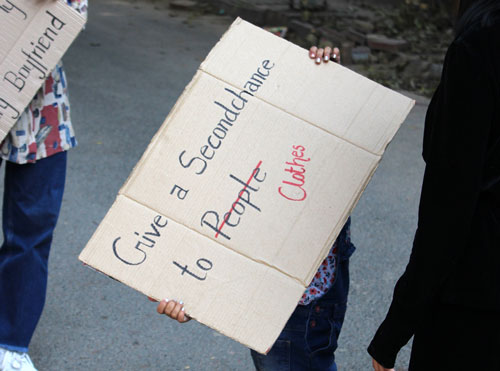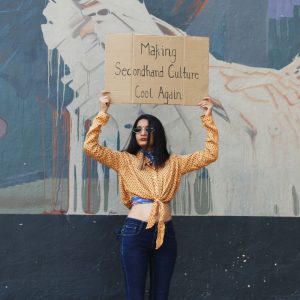If you flip through the pages of history, you will notice how every significant change has happened when a common person observes how something is done and wonders why it is done that way. Hence, beginning the journey of change and the factual story of a change-maker, intrigued by the whys and inspired to find the hows. Change-makers are not born, they discover themselves.
‘CF Celebrating Change-makers’ is a campaign dedicated to celebrating change-makers of our society. We took it upon us to find young and inspiring change-makers in Delhi/NCR and share their story with you. Our platform is now theirs.
Gauri, Founder, Livable Planet | Sustainability Advocate | Ecopreneur
Tell us about your work and the inspiration behind it.
Waste has always been my calling.. I used to wonder, “we have so much waste in abundance and why is it not used as a resource for making products.” This curiosity inspired me to leave my safe and secure job and start the journey of working on waste which led me to understand sustainability, carbon footprint and much more. Now, I curate sustainable brands to provide my audience an organic, plastic free and vegan product range, all under one roof.
What impact are you creating with your work?
I aim for a plastic and fabric-waste free India by 2030. I prioritise spreading awareness through my online and offline content in order to provide ways to live a zero waste generating and minimal life.
Often, we’re not able to find solutions to our queries and that’s why, via Livable Planet, I intend to give people the right answers and a simple way to lead a sustainable life.
What are more social impact areas that are of interest to you?
As mentioned above, waste which primarily includes single-use plastic and fast-fashion waste. Another cause close to my heart is ‘Animal Rights Protection’, which is why I turned vegan and determined not to consume or use any product that is otherwise. A couple more social causes that I want to readily take a stand on are ‘underpaid workers in the fashion industry, mica mining by kids in India, child labour, clean water and safety for women’.
How do you spend your leisure time?
I like spending time with my friends, watching movies / documentaries, travelling to places that are less-crowded, cooking and experimenting with whole-food plant based recipes and photography.
What role do you think a changemaker has in society?
Well, it doesn’t necessarily make a significant difference when a single person takes a thousand steps, it matters when a thousand people take that 1 step together. So, the role of a change-maker within a community doesn’t mean to impose, or just order what is right. We have to be the inspiration to bring that change for a revolution.
Click here to find Gauri’s work.
Ayushi, Sustainability Advocate | Artist | Illustrator
Tell us about your work and the inspiration behind it.
I was always creative even as a child and hence, knew that I wanted to make a career in the art and design arena. As I grew up, it became clearer to me that I felt more inclined towards designing clothes and pursued a degree in Fashion Design. Whereas during the course, I realised that my design thinking naturally accommodated ‘designing with minimum wastage, how to repurpose the waste generated by the fashion industry, and how to design something which does not kill our planet’. Slowly, I was inching closer towards circular design and sustainability.
Apart from that, I realised that I am a maximalist – I love colours, print, patterns, the amalgamation of anything and everything. I am ideally the opposite of minimalistic. So, that also gave me a niche to understand sustainability in a whole different way, i.e. upcycling waste into a functional design with bold, bright, and detailed aesthetics. This became the innate philosophy of my art and design practices.
Even after trying to work in fashion with brands of similar ethos I got slapped with the reality of the toxic fashion industry and how ‘ethical and sustainable brands are not really what they claim to be’.Thus, I left the fashion industry and turned into a full-time illustrator.
What impact are you creating with your work?
My art and design practice keenly focuses on the raw materials used in creating a product. I run #ProjectWasteNot which aims at upcycling waste into functional art. Along with that, I use alternatives to wood pulp papers to print my artworks, like cotton rag papers, agricultural waste pulp paper, aiming to reduce the flow of waste in landfills and creating something meaningful out of waste.
What are more social impact areas that are of interest to you?
The right to a living wage, a safe working environment, and abolishment of modern slavery.
How do you spend your leisure time?
During my free time, I like to read, visit monuments and art galleries.
What role do you think a like-minded community plays for change-makers?
I believe that a like-minded community plays the role of a support system as well as a knowledge reserve for change-makers.
Click here to find Ayushi’s work.
Muskaan, Sustainability Advocate | Ecopreneur | Illustrator
Tell us about your work and the inspiration behind it.
I am a digital illustrator, entrepreneur, and a designer. I am a sustainability advocate with a background in fashion. I co-founded a sustainable stationery and lifestyle brand – 0neByZer0. Where we partner with companies that work with recycling textile waste as well as traditional Indian crafts. We currently offer limited edition screen-printed notebooks, and digitally printed greeting cards, postcards, bookmarks, art prints, and stickers. All our products, except stickers are printed on recycled cotton rag paper. Going forward we want to move to eco-friendly inks/azo-free dyes for all our products. 0neByZer0 is my way of bringing together all the things that I love with sustainability at the heart of all the practices.
What impact are you creating with your work?
With 0neByZer0, we are able to use industrial textile and paper waste and turn it into meaningful new products. We are deviating the ‘waste’ from ending up in landfills and bringing them back into the cycle. Traditional papermaking, until 1790, was done using cotton rags and plant-based fibres and did not use wood pulp at all. Through our products, we are also able to keep our traditional papermaking, printmaking, and handicrafts alive in ways that align with today’s modern lifestyle.
What are more social impact areas that are of interest to you?
Slow fashion and accessible mental health resources for all.
How do you spend your leisure time?
Sky-gazing or binge-watching.
What role do you think a like-minded community plays for change-makers?
It is very empowering to meet and interact with like-minded people, especially while running a purpose-led initiative. Such communities make you realise that you’re not alone and that there are other people who care.






Good